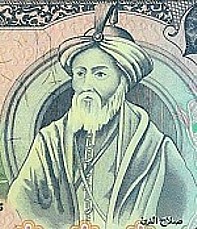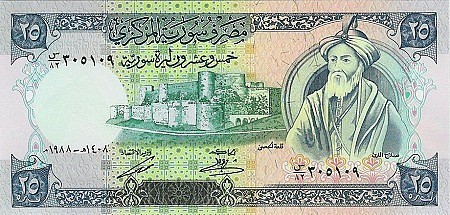SYRIA
Saladin “Salah Ad-din Yusuf ibn Ayyub”

Saladin was born into a Kurdish family in Tikrit, Iraq in 1138AD (1244 AH). His father, Najm ad-Din Ayyud had served as the governor of Tikrit for a while. In 1136 his uncle Shirkuh had killed a Christian during an argument in Tikrit, and as a result, Shirkuh and his brothers, including Ayyud, were exiled from Tikrit. Legend has it that Saladin was born on the night of their departure from Tikrit. Through his political connections Ayyud shortly became the governor of Damascus, Syria.
Saladin’s education focused on religious studies while he was living in Syria with his father. But he eventually received military training via his uncle, Shirkuh, who had been serving a military post in Egypt under the Turkish ruler Nur ad-Din, who was trying to combine Muslim forces against the Crusader army. Shirkuh had been sent to defeat the Fatimids, who at one time the ruling caliphate of most of North Africa, but whose power had shrunk to the control of Egypt at that time. The Fatimid’s were then allied with the crusader King of Jerusalem, Amalric I. With his uncles training, Saladin helped to defeat the Fatimids, seizing control from the Vizier Shawar, allowing Shirkuh to rule Egypt for only two months before his death, upon which Saladin assumed the title of Vizier of Egypt in 1169AD. Saladin now had the control of the Egypt, but only as the representative of the Turkish leader Nur ad-Din. But Amalric I soon started to lay siege to the Egyptian town of Damietta. The siege was long and famine soon broke out amongst the crusaders. A treaty was brokered by Saladin and Amalric I returned to Jerusalem.
Upon Nur ad Din’s death, Saladin became confident that he could exert more of his power. He became Sultan of Egypt and returned power to the Sunni’s in Egypt. He also began a series of campaigns against small Muslim groups and eventually conquered all of Egypt, Syria, Iraq, Hejaz, and Yemen.
In July of 1187, after conquering most of the kingdom of Jerusalem, Saladin was ready to take the fortified city of Jerusalem. The city was under the control of Balian of Ibelin, who had famously inspired the inhabitants to fight after he knighted 60 of the inhabitants. Saladin’s gracious terms for surrender were refused by Balian, and Saladin began to lay siege. After knocking down portions of the wall, Saladin’s forces were still not able to enter into the fortified city. Angered by the refusal to surrender and having to take military action, Saladin at first refused to give quarter to the non-Muslims within Jerusalem, but a threat by Balian to kill the 5,000 Muslims within Jerusalem and to destroy the Muslim holy sites were enough to convince Saladin to come to terms with Balian for the surrender of Jerusalem. It was agreed that seven thousand men would be allowed to peacefully leave the city for the sum of 30,000 Bezants (a gold coin used to make ritual payments of respect). In their place, either two women or 10 children could be granted leave for the same amount. All others would be taken as slaves.
In October 1187AD Jerusalem fell to Saladin, ending over 80 years of Crusader control of that kingdom. Balian handed over the keys to the Citadel. Even though not all payments were made, many would-be-slaves were allowed to proceed out of the city and return home.
Largely as a result of his religious training, Saladin was known as a temperate, moral leader. He was known to treat enemies in a chivalrous manner, but he had his limits. During his campaign there, he captured Raymald of Chatillon, a long time adversary who had been attacking Muslim pilgrims for many years. He had Raynald of Chatillon executed for his attacks on the pilgrims. He also had a large number of Knights Templar and Hospitaller Knights (an organization devoted to caring for the poor and sick pilgrims to Jerusalem that later morphed into a military organization to protect the Holy Land) killed because their religious zeal for killing could not be tempered.
This was not the end of the Crusades, however; they raged on. After Richard I (the Lionharted) executed 3,000 Muslims, Saladin killed all captured Franks within the space of a month of battle. Rather than lead to a bitter rivalry, there ensued an odd comrade-ship between Saladin and Richard I. When Richard I became gravely ill and news of this came to Saladin, who quickly dispatched fresh fruit with snow to keep it cool to Richard I along with the offer of Saladin’s personal physician. And when Richard I lost his horse in battle, Saladin replaced it with two of his own horses. In return, Richard offered his sister to Saladin in marriage, and suggested giving the potential couple the kingdom of Jerusalem as a wedding gift. Instead of becoming a wedding gift, however, in 1192 after the battle of Arsuf the city was subject of a treaty, known as the treaty of Ramla, wherein it would be under Muslim control, but Christian pilgrims were allowed access. Neither one liked the overall outcome of the treaty; Saladin was weakened by war and Richard I had to return to England and deal with other matters, so it was agreed upon hastily.
The next year, 1193, Saladin died in Damascus, Syria. It is widely known that upon looking into his coffers, there wasn’t enough money to even cover the cost of his funeral, as he had given most of it away to charity. He was thus buried in a mausoleum in a garden near Umayyad Mosque in Damascus.

